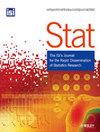What matters to graduate students? Experiences at a statistical consulting center from pre‐ to post‐COVID‐19 pandemic
IF 0.8
4区 数学
Q3 STATISTICS & PROBABILITY
引用次数: 0
Abstract
The COVID‐19 pandemic led to unprecedented changes in all levels of society, including the statistical consulting field. This paper focuses on the experiences of graduate student consultants and clients at our statistical consulting center (SCC) that operates all year independent of semesters. During the lockdown period, work continued without interruption and was conducted remotely, but there was a temporary reduction in utilization. Advice on statistical methods, help with data analysis and educational offerings are the main appeals to utilize SCC services. We describe our mentoring approach for graduate student research assistants (RAs) and how pandemic changes affected RAs and clients. Based on experiences during the pandemic, we offer practical suggestions for SCCs' approaches to research support, work characteristics and collaborations to improve the experiences of graduate students, both as consultants and clients. Most collaboration meetings are now virtual by request from clients. Telecommuting supports flexible personal schedules and needs. Online educational offerings provide easier access for participants and more opportunities for a wider range of topics and presenters. However, mentoring sessions for RAs are best conducted in‐person, and every effort should be made to encourage in‐person interactions and collaborations between staff members to advance the effectiveness of post‐pandemic SCCs.什么对研究生很重要?从 COVID-19 流行前到流行后在统计咨询中心的经历
COVID-19 大流行导致社会各个层面发生了前所未有的变化,包括统计咨询领域。本文重点介绍了我们统计咨询中心(SCC)的研究生咨询师和客户的经历,该中心全年运作,不受学期限制。在封锁期间,中心的工作没有中断,而且是远程进行的,但使用率暂时有所下降。有关统计方法的建议、数据分析帮助和教育课程是利用 SCC 服务的主要原因。我们介绍了针对研究生研究助理 (RA) 的指导方法,以及大流行病的变化对研究助理和客户的影响。根据大流行病期间的经验,我们对 SCC 在研究支持、工作特点和合作方面的方法提出了切实可行的建议,以改善研究生作为顾问和客户的体验。现在,大多数合作会议都是应客户的要求举行的虚拟会议。远程办公支持灵活的个人时间安排和需求。在线教育为参与者提供了更便捷的途径,也为更广泛的主题和主讲人提供了更多机会。然而,针对 RA 的指导课程最好是面对面进行,应尽一切努力鼓励工作人员之间的面对面互动与合作,以提高流行病后 SCC 的有效性。
本文章由计算机程序翻译,如有差异,请以英文原文为准。
求助全文
约1分钟内获得全文
求助全文
来源期刊

Stat
Decision Sciences-Statistics, Probability and Uncertainty
CiteScore
1.10
自引率
0.00%
发文量
85
期刊介绍:
Stat is an innovative electronic journal for the rapid publication of novel and topical research results, publishing compact articles of the highest quality in all areas of statistical endeavour. Its purpose is to provide a means of rapid sharing of important new theoretical, methodological and applied research. Stat is a joint venture between the International Statistical Institute and Wiley-Blackwell.
Stat is characterised by:
• Speed - a high-quality review process that aims to reach a decision within 20 days of submission.
• Concision - a maximum article length of 10 pages of text, not including references.
• Supporting materials - inclusion of electronic supporting materials including graphs, video, software, data and images.
• Scope - addresses all areas of statistics and interdisciplinary areas.
Stat is a scientific journal for the international community of statisticians and researchers and practitioners in allied quantitative disciplines.
 求助内容:
求助内容: 应助结果提醒方式:
应助结果提醒方式:


